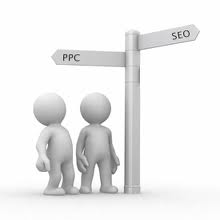Essential Guide to SEO or Pay Per Click
 You now may have your website looking great with fantastic content.
You now may have your website looking great with fantastic content.
The next step that you will probably be asking yourself is what do I need to do to market my website. This is sometimes known as defining a search engine marketing strategy (SEM).
Companies often reach a point where they feel they must choose between search engine optimization (SEO) and pay per click (PPC). In this article we will explain:
- Which one is better suited for the business model?
- Which one is more effective in driving traffic, leads and sales?
- Should they be used simultaneously or in isolation?
Definitions
Search engine optimization (SEO)
Search engine optimization is when you modify or improve your website to rank higher in the organic (regular) listings on Google, Yahoo, Bing, etc. With SEO, your rankings will be determined by such things as link popularity and content relevance.
Pay per click ( PPC)
Pay per click is the paid approach to search engine marketing. This is when you pay a certain amount for every click you receive through a search engine. Your ad will appear in the shaded “Sponsored Results” section of the listing page. With PPC, your rankings will be determined by the amount you bid on keywords and the click-through rate generated by your ads.
Search engine marketing strategy tips
We recommend that you think about the following tips when thinking about your search engine marketing strategy:
- If your website is part of your long-range marketing plan, you should incorporate SEO into the plan.
- Make it a regular part of your website development program.
- With SEO, you are planting the seeds for long-term visibility.
- If you need more search engine traffic in the meantime, you can always implement a PPC campaign as well.
- Use pay per click in addition to search engine optimization, not in lieu of it.
When to use Pay Per Click (PPC)
For fast results PPC marketing (such as Google Adwords) can help you drive targeted visitors to your website in a hurry. It is also good if you have a smaller budget. But it has a significant downside. With pay per click, you have to pay for every click to your website. The moment you cancel the campaign, the traffic stream stops.
When to use Search engine optimization (SEO)
Search engine optimization more long term advantages than PPC:
1. SEO provides lasting benefits.
Pay per click comes on like a light switch. You’ll get clicks and visitors as soon as you activate the campaign. It goes off like a switch too, the minute you stop paying for those clicks.
Search engine optimization works differently. It offers lasting benefits. To improve your organic search engine rankings, you need to develop keyword-rich content and a strong linking profile. It may take a while (over 6 months) to accomplish these things, but the results outlast the efforts. So in the long run, SEO is a better value than PPC.
2. SEO forces website improvements.
With pay per click, you get the visitors you pay for. With search engine optimization, you get the visitors you earn. This is a key distinction between paid and organic search marketing. With SEO, you attract visitors by developing a high-quality website that meets their needs in some way. It takes work to accomplish such a goal. At first glance, this may seem like a disadvantage. But it’s actually a good thing. SEO forces you to do things you should be doing anyway (things like content development, website usability and online networking). Your website will come out of it better than when you started.
What to know more?
Contact us to discuss your individual situation and find out what mix you should be using for your search engine marketing
